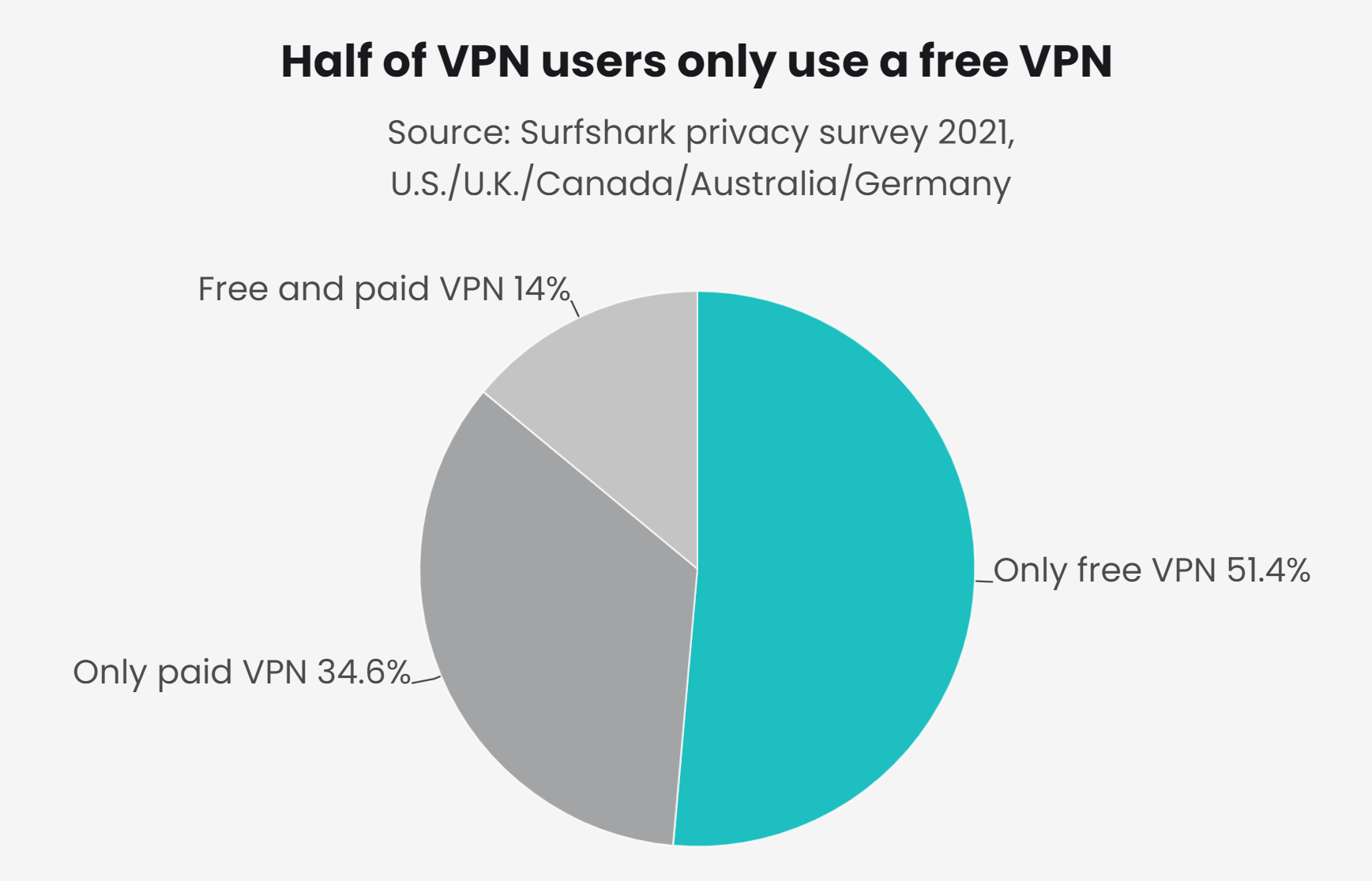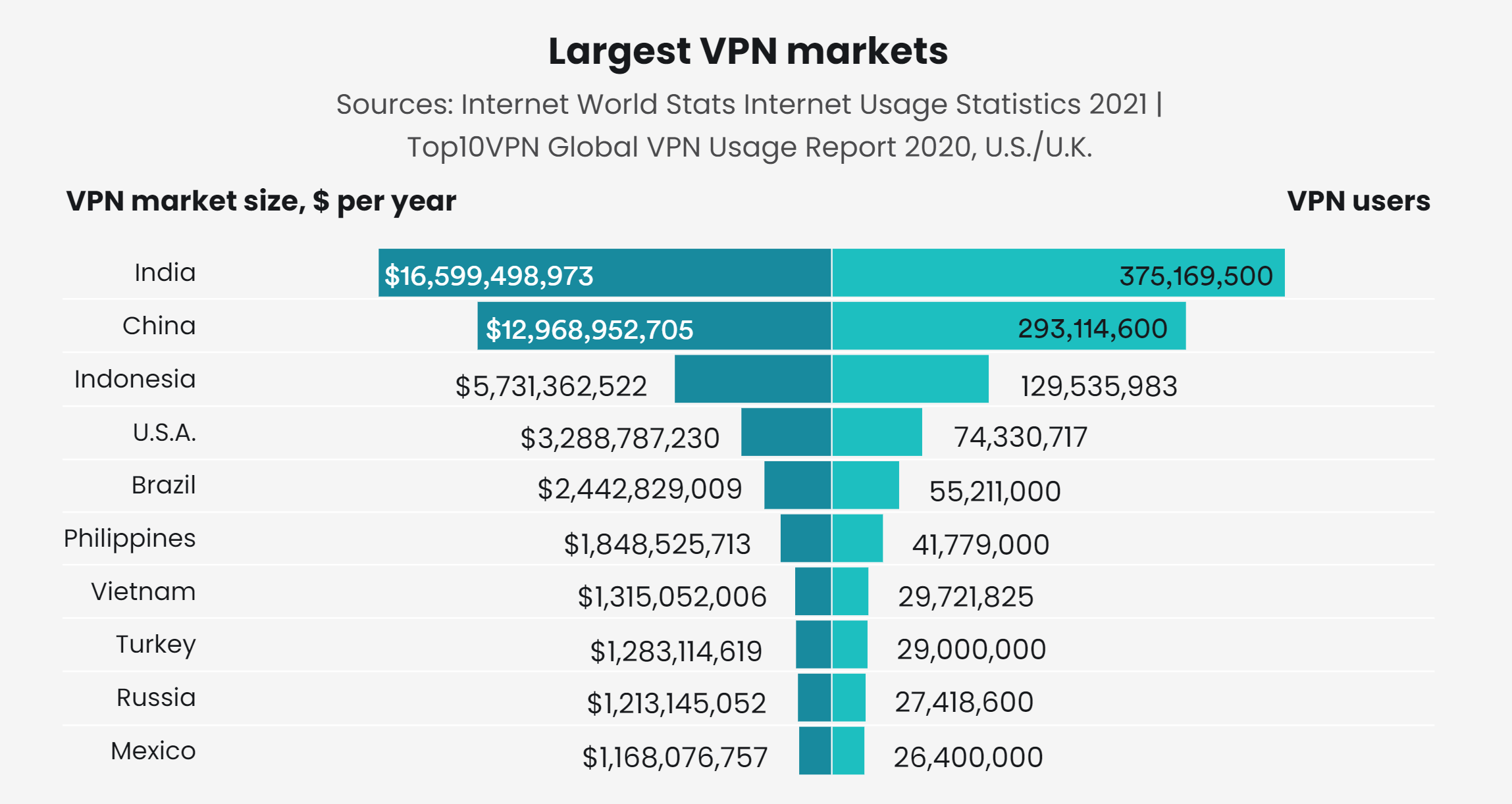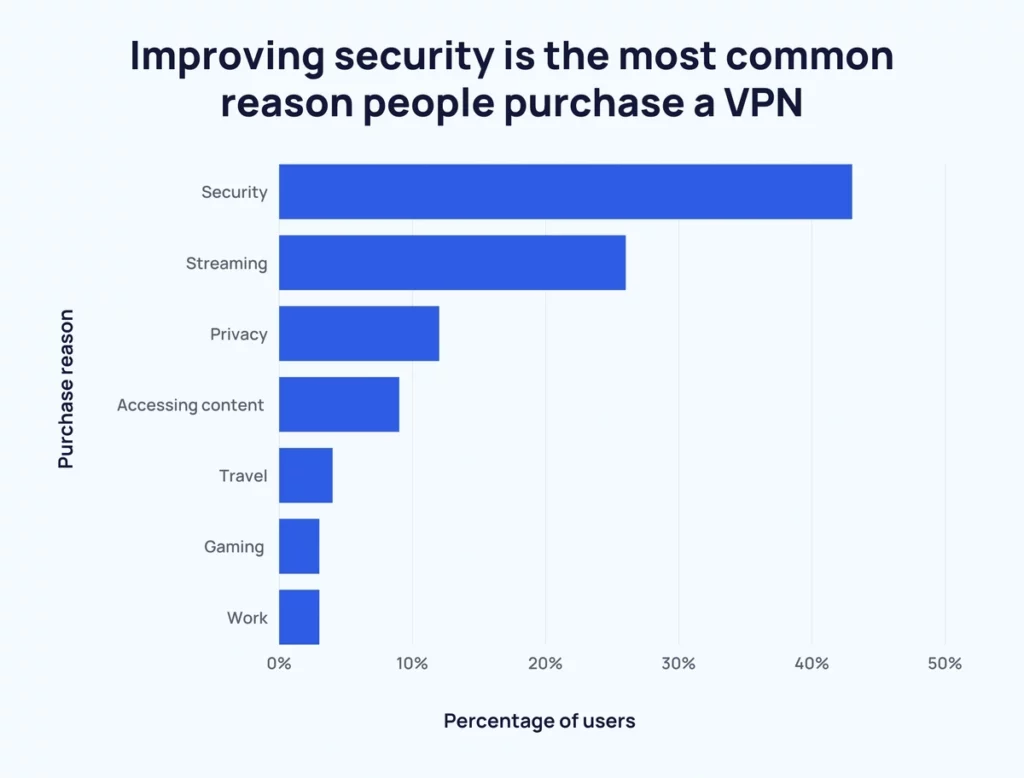When they were first invented in the late 1990s, VPNs (virtual private networks) were the sort of niche tool that only some businesses (and your nerdy, computer geek friend) might have known about.
However, that all began to change in the mid-2010s when data theft and security became a real problem, and the popularity of VPNs started to take off. Fast forward to 2025, and what does the VPN landscape look like now? Let’s take a look.
Summary: How many people use a VPN?
VPN use has been increasing rapidly around the globe, although this increase is more drastic in some countries and regions than others.
Thanks to the diversity and sheer size of the VPN provider market, it’s difficult to get an exact figure on the number of people using a VPN globally. However, it’s estimated that out of the 5.3 billion internet users in the world, about a third of them (31%) are using a VPN in 2025.
- There are 1.6 billion VPN users in the world.
- The global VPN market is worth $44.6 billion and is projected to grow to $101 billion by 2030.
- 93% of companies currently use a VPN.
Today, the number of people using VPNs around the world is skyrocketing, and the trend shows no sign of slowing down.
The number of people using a VPN was easier to measure when the field was dominated by only a small handful of companies, but this is no longer the case.
There are now tonnes of different VPN providers, making it much more difficult to say exactly how many people worldwide will be using a VPN in 2025.
But that doesn’t mean that we can’t make a good guess. First, let’s look at what we know about VPNs, who uses them, and for what purposes.
2025 Trends in VPN Usage
The data doesn’t lie: it’s clear that VPNs have gone from being a niche tool used by only a handful of computer enthusiasts and businesses to a tool that’s vital for online protection and security.
 In 2020, users from 85 countries downloaded a VPN over 277 million times. By 2021 that number had risen to 785 million downloads, and by 2023, users downloaded VPN applications nearly 430 million times.
In 2020, users from 85 countries downloaded a VPN over 277 million times. By 2021 that number had risen to 785 million downloads, and by 2023, users downloaded VPN applications nearly 430 million times.
Source: Atlas VPN ^
And the upward trend shows no sign of stopping. The market for VPNs can be divided into two general categories: consumer VPNs used by individuals and business VPNs used by companies.
Singaporeans are the leaders in using VPNs, with over 19% using a VPN this year. The UAE and Qatar are second and third, at 17% and 15% respectively.
 Currently, the market of consumer and business VPNs combined is estimated to be worth at least $44.6 billion worldwide.
Currently, the market of consumer and business VPNs combined is estimated to be worth at least $44.6 billion worldwide.
Source: Surfshark ^
And this growth trend is likely to accelerate rapidly. Unless something unforeseen happens, it’s estimated that the total value of both the consumer and business VPN industry combined is expected to be worth $101.31 billion by 2030.
 Despite the enormous value of the VPN market, almost 50% of personal VPN users still use free providers.
Despite the enormous value of the VPN market, almost 50% of personal VPN users still use free providers.
Source: Security.org ^
More than half of all VPN users only use a free VPN.

This is a worrying statistic as the reported privacy and security risks of using a free VPN are alarming.
This could change very shortly, though, as two out of three free VPN users report performance issues and express concerns about how safe their data really is.
 In 2024, NordVPN is the highest ranked VPN in the B2C segment, and Cisco has the biggest enterprise VPN market share.
In 2024, NordVPN is the highest ranked VPN in the B2C segment, and Cisco has the biggest enterprise VPN market share.
Source: Similarweb & Datanyze ^
NordVPN is the biggest VPN company in the consumer and B2C segment. When it comes to enterprise VPNs, Cisco has the biggest market share at 24.8%, followed by Juniper VPN at 10.2%.
In April 2022, Nord Security (parent company of NordVPN) raised $100 million in its first-ever external investment round at a $1.6 billion valuation. In just over a year, Nord Security has doubled its valuation to $3 billion.
Who is Using a VPN?
 In 2021, China opened its VPN sector to foreign investments and is predicted to have the highest growth in 2025 (17.4%), followed by Canada (12.8%) and Japan (12%).
In 2021, China opened its VPN sector to foreign investments and is predicted to have the highest growth in 2025 (17.4%), followed by Canada (12.8%) and Japan (12%).
Source: VPNPro ^
One way to measure the growth in popularity of VPNs is a metric known as adoption rate, a percentage that reflects how many individual VPN downloads occurred in a country in a given year adjusted for population size.
China is expected to be the fastest-growing VPN market and reach $11.2 billion by 2026.
 In 2023, the country with the highest VPN adoption rate was Singapore (19% adoption rate), followed by the United Arab Emirates (17% adoption rate), and Qatar (15% adoption rate).
In 2023, the country with the highest VPN adoption rate was Singapore (19% adoption rate), followed by the United Arab Emirates (17% adoption rate), and Qatar (15% adoption rate).
Source: AtlasVPN ^
Interestingly, five out of the top 10 countries with the highest adoption rates in 2022 were Middle Eastern countries.

On the other hand, the three countries with the lowest adoption rate are Colombia (0.56%), Japan (0.49%), and Venezuela (0.37%).
The United States comes in at number 14 with a 5.4% adoption rate.
 The top 3 biggest markets for VPN companies as of 2025 are India, China, and Indonesia. This is likely due to the large population size of all three countries in addition to political factors such as government censorship.
The top 3 biggest markets for VPN companies as of 2025 are India, China, and Indonesia. This is likely due to the large population size of all three countries in addition to political factors such as government censorship.
Source: Surfshark ^
But who exactly are these individual users? Can we get a bit more specific?
Across all countries, Global Web Index found that 74% of VPN users are young (between the ages of 16 and 24), while those aged 55+ use VPNs the least (28%).

 Individual data about VPN usage is largely anonymous, it is hard to gather data about who is male and who is female. But, the Global Web Index estimates that at least 34% are male and 25% are female.
Individual data about VPN usage is largely anonymous, it is hard to gather data about who is male and who is female. But, the Global Web Index estimates that at least 34% are male and 25% are female.
Source: Global Web Index ^
The Global Web Index, has provided an estimate suggesting that among VPN users, at least 34% are male and 25% are female. It’s important to note that these figures are estimates and might not precisely represent the actual gender distribution, as the nature of VPN usage inherently limits the accuracy of such data
Why Are People Using VPNs?
VPNs have a wide range of uses and functions, so it stands to reason that people use them for various reasons. Additionally, the reasons are likely to change depending on the political circumstances of the country where a particular user resides.
 42% of personal VPN users in the US have it for security reasons, 26% use a VPN for streaming. The top reason for business VPN use is company policy at 70% and accessing corporate networks securely (62%).
42% of personal VPN users in the US have it for security reasons, 26% use a VPN for streaming. The top reason for business VPN use is company policy at 70% and accessing corporate networks securely (62%).
Source: Security.org ^
In the USA, security and privacy are the top concerns for personal VPN users, while only 44% want to keep their online activity hidden from ISPs and search engines.
Public Wifi protection is the least important reason (28%), and 37% like to use their VPN for unrestricted access to content.

On the other hand, business VPN use is largely down to requirement/obligation and allowing safe access to corporate networks.
Public Wifi is also not a key reason for using a VPN, and only 11% of business users say it’s why they have one in place.
 Globally, the top motivation for using a VPN is to access better entertainment and content (51%), followed by the ability to access social networks, news, and services that are restricted in the user’s country.
Globally, the top motivation for using a VPN is to access better entertainment and content (51%), followed by the ability to access social networks, news, and services that are restricted in the user’s country.
Source: Global Web Index ^
The other reasons people listed included staying anonymous while browsing (34%), accessing sites and files at work (30%), torrenting and downloading other restricted files (30%), communicating with friends and family abroad (27%), hiding internet activity from the government (20%), and accessing a tor browser (19%).
In countries where news and social media outlets are often blocked, censored, or monitored, using a VPN is an easy and popular way to get around government restrictions while keeping your identity anonymous.
How Many People Are Using VPNs in 2025?
It’s safe to say that a lot of people are now using VPNs.
The popular VPN provider Surfshark estimates that about 1.6 billion people will be using a VPN in 2025.

To give you an idea of just how huge that number is, think about it this way: there are around 8 billion people on earth. Of those 8 billion, just over 5 billion are internet users.
 If 1.6 billion people are using a VPN, that means that around a third (or 31%) of all internet users are using a VPN.
If 1.6 billion people are using a VPN, that means that around a third (or 31%) of all internet users are using a VPN.
Source: Surfshark ^
However, this estimate is likely slightly less than the real number of VPN users, as the statistic only includes users in countries with a market penetration (a measurement of how much or how often a service is being used relative to its estimated market) of 10% or greater.
What about in the US specifically?
 68% of all Americans currently use a VPN for either personal or business use.
68% of all Americans currently use a VPN for either personal or business use.
Source: Earthweb ^
That means that (theoretically) around 142 million Americans are familiar with the technology. 96% of these users say their service is somewhat or highly effective.
Wrap Up
All of these VPN usage statistics paint a clear picture: the VPN market is booming and shows no sign of slowing down. Although the United States still accounts for the largest market share, Middle Eastern countries have the fastest adoption rate.
People worldwide use VPNs for various reasons, from accessing entertainment and bypassing the pesky government censorship and geo-blocking to protecting their privacy and anonymity online.
Although VPNs were once primarily used by businesses, individual consumer demand is growing even faster. And as this demand continues to increase, so does the number of VPN providers.
This supply growth is driven by the growing demand to bypass geo-restricted content, paywalls, and avoid government censorship while protecting mobile, desktop, and Internet of Things (IoT) devices.
Combine this with more affordable prices, and it’s clear that VPNs are fast becoming as essential as malware protection software.
If you’re in the market for a VPN, you must consider your options carefully and choose a secure, trusted VPN provider.
References
- https://datareportal.com/global-digital-overview
- https://www.similarweb.com/top-websites/computers-electronics-and-technology/computer-security/
- https://www.statista.com/statistics/542817/worldwide-virtual-private-network-market/
- https://www.statista.com/statistics/1343692/worldwide-virtual-private-network-reasons-usage
- https://www.datanyze.com/market-share/vpn–326/
- https://www.security.org/blog/resources/vpn-consumer-report-annual/
- https://earthweb.com/vpn-statistics/
- https://surfshark.com/blog/vpn-users
- https://atlasvpn.com/vpn-adoption-index

 In 2020, users from 85 countries downloaded a VPN over 277 million times. By 2021 that number had risen to 785 million downloads, and by 2023, users downloaded VPN applications nearly 430 million times.
In 2020, users from 85 countries downloaded a VPN over 277 million times. By 2021 that number had risen to 785 million downloads, and by 2023, users downloaded VPN applications nearly 430 million times.